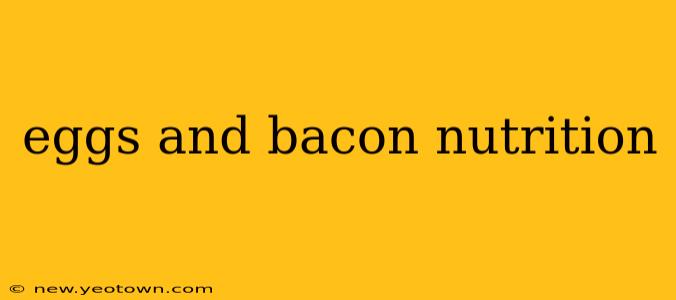Let's face it, the classic pairing of eggs and bacon is a breakfast staple for many. The sizzling bacon, the runny yolk… it's a culinary comfort. But beyond the deliciousness, what's the real nutritional story behind this beloved duo? We'll delve into the individual nutritional profiles of eggs and bacon, exploring their benefits and drawbacks, and answering some frequently asked questions. Prepare for a delicious deep dive into the world of eggs and bacon nutrition!
What are the nutritional benefits of eggs and bacon?
This seemingly simple question opens a door to a surprising amount of nuance. While neither eggs nor bacon are perfect health foods, both contribute valuable nutrients to a balanced diet. Eggs, for instance, are a fantastic source of high-quality protein, essential for building and repairing tissues. They’re also packed with choline, crucial for brain health and liver function. Furthermore, eggs contain vitamins like A, D, E, and K, along with several B vitamins.
Bacon, on the other hand, provides a good dose of protein, albeit with a higher fat content. The type of fat in bacon is largely saturated, which isn't ideal for cardiovascular health in large quantities. However, bacon does contain some B vitamins, particularly vitamin B12, vital for nerve function and red blood cell production. It's important to remember that the nutritional content can vary greatly depending on the type of bacon (e.g., turkey bacon vs. pork bacon) and how it's prepared.
Is bacon unhealthy?
This is a question that deserves a nuanced answer. The truth is, moderation is key. Bacon is undeniably high in saturated fat, sodium, and calories. Consuming too much can contribute to heart disease, high blood pressure, and weight gain. However, occasional consumption as part of a balanced diet isn't necessarily detrimental. Choosing leaner options like turkey bacon can help mitigate some of these concerns, as can mindful portion control.
How many calories are in eggs and bacon?
The caloric content of eggs and bacon varies significantly depending on the quantity and preparation method. A large egg typically contains around 78 calories, while a single slice of bacon can range from 30 to 50 calories, depending on its thickness and type. Therefore, a breakfast of two eggs and three slices of bacon could easily exceed 250 calories. This caloric count can quickly add up, especially if consumed regularly without mindful consideration of the rest of your daily intake.
Are eggs and bacon good for weight loss?
This depends entirely on the context of your overall diet. Eggs and bacon, on their own, are not inherently conducive to weight loss due to their relatively high calorie and fat content. However, incorporating them into a balanced, calorie-controlled diet that focuses on whole foods and regular exercise could be part of a successful weight-loss strategy. It's crucial to consider portion sizes and the nutritional makeup of your entire daily diet rather than focusing solely on this single food combination.
What are the health risks associated with eating eggs and bacon?
While delicious, overindulging in eggs and bacon can carry health risks. High cholesterol levels and heart disease are potential concerns due to the saturated fat in bacon. Excessive sodium intake from bacon can contribute to high blood pressure. Also, processed meats like bacon have been linked to an increased risk of certain cancers. Remember, moderation is paramount. Balancing your intake of eggs and bacon with plenty of fruits, vegetables, and lean protein is crucial for maintaining overall health.
Conclusion: Finding the Right Balance
Eggs and bacon, enjoyed in moderation as part of a varied and balanced diet, can contribute valuable nutrients. However, overconsumption carries potential risks. Understanding the nutritional profile of each component, making informed choices regarding portion sizes and preparation methods, and considering your overall dietary habits are vital for maximizing the benefits and minimizing the risks associated with this breakfast favorite. Listen to your body, pay attention to your individual needs, and enjoy this classic pairing responsibly!

